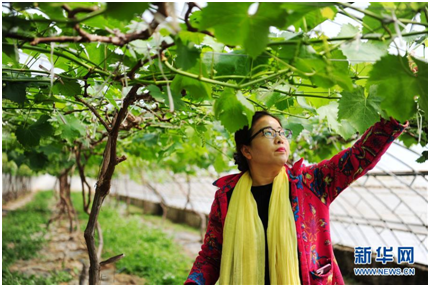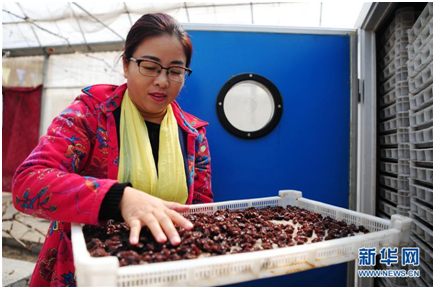Modern farming provides Xiahui farmers with higher quality and efficiency
chinagate.cn,March 11, 2019 Adjust font size:

The greenhouses of Yang Yuying, founder of Weinan Yumei Modern Agricultural Demonstration Garden, introduces 36 grape varieties which ensures a long and stable harvest season spanning from late May to early November. [Photo by Zhang Bowen/ Xinhuanet.com]
With her well-tailored red coat and her neat makeup, it would be easy to imagine Yang Yuying as something other than a farmer. But in fact she has been a farmer for more than seven years, and was honored as one of the “Top Ten Professional Farmers in Shaanxi” in 2017.
A native of Xiahui Town, Weinan City of Shaanxi Province, Yang left her hometown at the age of 19 and began to work as a salesperson in Beijing. Later, she got a job with a company that produces equipment used in Protected Agriculture -what Americans called controlled-environment agriculture - such as greenhouses. Having seen the advantages of this technology-based approach toward food production and the huge profits it brings to farmers, Yang was keen to introduce protected agriculture to her fellow villagers back home. But she found they regarded this technology as unnecessary and costly.
To show villagers the advantages of controlled-environment agriculture, in July 2017, Yang established the Weinan Yumei Modern Agricultural Demonstration Garden in Xiahui, whichis known as “the township of grapes” in the region.
To date, Yang has introduced 36 grape varieties in the garden, which ensures a long and stable harvest season spanning from late May to early November. She knows the variety and age of every grapevine in her greenhouses.
“The produce in my greenhouses is all pollution-free. We never cut the prices, but we never have to worry about sales either,” she says. According to Yang, one variety of her grapes, called Yina Queen, even sells at 160 yuan (U.S. $25) per kg, while the common varieties on the market sell at only 8 yuan (U.S. $1.25).
Yang has joined many WeChat groups, where fellow growers and merchants discuss and exchange information on grape-growing, such as new species and their markets. “You will be well informed with the market if you make friends with fellow growers and merchants,” says Yang.

Having installed heavy drying equipment in 2016, Yang’s Yumei Garden began to sell organic raisins. [Photo by Zhang Bowen/ Xinhuanet.com]
In addition to growing grapes, the garden also produces other fruits like strawberries and watermelons, vegetables like celery and tomatoes. It dries raisins, raises chicks, ducks and geese, and arranges sightseeing and fruit-picking visits. Currently, it receives 8,000 such visits annually. This drives grape production in more than 2,200 nearby households, covering a total planting area of1, 000 hectares.
Jing Maiwa, formerly an impoverished farmer from Shensi Village of Xiahui, has been working in the Yumei garden since May, 2014.Earning 60 yuan a day (U.S. $9), and about 10,000 yuan a year (U.S. $1,560), he has crossed over the annual poverty line of 2,300 yuan (U.S. $360).
Many workers in the garden also plant grapes back home. Jing’s family owns a 0.3 acre vineyard. But according to him, his grapes didn’t grow and sell well in the past.
To improve these villagers’ farming skills, Yang organizes at least ten technical training courses every year, covering fertilization, insecticide spraying, etc. The number of training courses differs depending on attendees’ knowledge of each variety. These courses attract 15,000 attendees each year.
According to Yang, villagers were earning only about 48,600 yuan (U.S. $7,600) per acre in 2015, but with the establishment of greenhouses and the provision of technical training, the income per acre increased to 91,000 yuan (U.S. $14,200) in 2016.
“I hope more and more farmers will recognize the advantages of modern farming methods and use them as a tool to shake off poverty,” says Yang.
Translated by Wu Tong